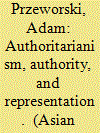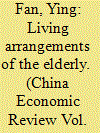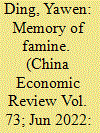|
|
|
Sort Order |
|
|
|
Items / Page
|
|
|
|
|
|
|
| Srl | Item |
| 1 |
ID:
172652


|
|
|
|
|
| Summary/Abstract |
Representation is always a dynamic relation, a tatonnement, in which the represented adjust their preferences on the basis of beliefs induced by the representatives. All rulers—those selected in clean elections, those who hold such ceremonies without putting their power at stake, and those who do not even bother to hold them—claim to have reasons to be followed, and people are willing to follow them if they believe these are good reasons. Thus, individual preferences, “wills,”are influenced by the relation of representation. The controversial issue is whether the relation of representation can be assessed when preferences are endogenous, in particular when people are not exposed to a plurality of reasons.
|
|
|
|
|
|
|
|
|
|
|
|
|
|
|
|
| 2 |
ID:
154051


|
|
|
|
|
| Summary/Abstract |
The “essence” of the EU is essentially all about subjecting inter-state relations to the rule of law and it is but natural for the Union to preach and practice multilateralism, both in domestic and external fronts. The EU’s preference for multilateralism remains at two levels. At the first level, the Union expects that the third countries must have direct relations with it at the multilateral level than with its member states bilaterally and at the second stage, the EU professes multilateralism at the international level with the UN at its centre.
|
|
|
|
|
|
|
|
|
|
|
|
|
|
|
|
| 3 |
ID:
181778


|
|
|
|
|
| Summary/Abstract |
Many countries, states, and territories have set short and long term targets to increase the share of renewable sources for electricity generation as part of their respective energy policies. Increased reliance on renewables can occur from several sources (e.g., biomass, solar, hydro, wind). Similarly, when increasing renewables, a decreased reliance on one or more non-renewable (e.g., coal, gas, oil, nuclear) sources must occur. However, each region is different with respect to its present profile and capabilities to generate electricity. Complicating this is that demand can differ across individuals, states and territories. By using a discrete choice experiment and latent class hybrid choice model (LCHCM), we estimate individual willingness to pay (WTP) values among four renewable and four non-renewable energy sources for residents across Australia’s states and territories. The model identifies two latent segments in relation to WTP, which can be described using differences in pro-environmental attitudes and socio-demographics. The findings reveal that preferences in terms of energy mix composition for electricity generation are heterogeneous across Australia states and individuals. WTP is found to be higher for biomass, whilst those who are younger, males and those holding pro-environmental attitudes are also supportive of hydro and solar over gas and nuclear sources.
|
|
|
|
|
|
|
|
|
|
|
|
|
|
|
|
| 4 |
ID:
161844


|
|
|
|
|
| Summary/Abstract |
As the foundation of elderly care, living arrangements are closely connected with the physical and psychological well-being of the elderly and the social resources allocation. The objective of this study is to understand the constraints between the preferred and actual choices of elderly living arrangements in China. We first establish a standardized theoretical model and derive two hypotheses on choice constraints. Based on the CHARLS database, we empirically test the theoretical hypotheses based on multiple-step empirical tests. Our findings are as follows. 1) The correlation between elderly income and the likelihood of living with their children is nonlinear: when the elderly prefers to live apart, their higher absolute income provides a greater likelihood that they can do so, and when they prefer to live with their children, the relative income of the elderly and their children are important in the likelihood of living together. 2) The poorer the health status of the elderly, the greater likelihood that they live with their children, particularly if they have daughters. The results are robust after controlling for the potential endogeneity issue, the passive choice situation, and volatility in preference.
|
|
|
|
|
|
|
|
|
|
|
|
|
|
|
|
| 5 |
ID:
187859


|
|
|
|
|
| Summary/Abstract |
The 1959–1961 Great Famine in China was one of the most devastating events in history and had long-term effects on economic behavior. This paper seeks to provide a novel explanation for heterogeneous food waste behaviors across age cohorts from the perspective of differing famine experiences. Based on 2004–2009 China Health and Nutrition Survey (CHNS) data, this paper constructs a difference-in-difference estimator to explore the long-term effects of the early-life famine experience of the household head on household food waste behavior in later life. The results indicate that the more serious famine that the household head experienced in early life was, the less wasted food and lost calories per capita there were, especially for adolescence during the famine. The mechanism analysis shows that households whose heads experienced the 1959–1961 Great Famine in early life tend to save more than those whose head did not. The findings contribute to a better understanding of the formation of preference and the variation in household food waste behaviors across age cohorts.
|
|
|
|
|
|
|
|
|
|
|
|
|
|
|
|
| 6 |
ID:
150033


|
|
|
|
|
| Summary/Abstract |
While the share of renewable energy, especially wind power, increases in the energy mix, the risk of temporary energy shortage increases as well. Thus, it is important to understand consumers' preference for the renewable energy towards the continuous growing renewable energy society. We use a discrete choice experiment to infer consumers' preferences when the share of renewable energy increases. The study results indicate that consumers are generally willing to pay extra for an increasing share of renewable energy, but the renewable energy should come from a mixture of renewable energy sources. We also found that consumers prefer to trade with their current supplier rather than another well-known supplier. This study contributes to the energy portfolio theories and the theory of energy diversification in a consumer perspective. The managerial implications of this study are also discussed.
|
|
|
|
|
|
|
|
|
|
|
|
|
|
|
|
|
|
|
|
|